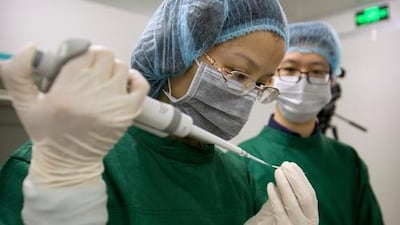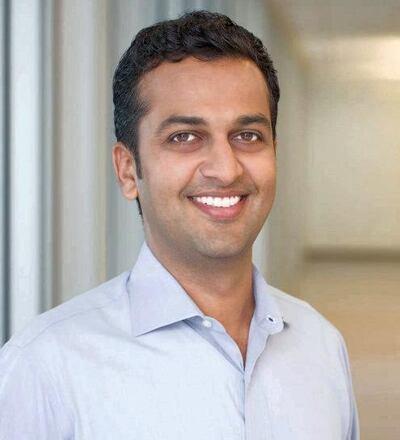A little more than two centuries ago, an English novelist named Frances Burney endured a “terrible operation” to remove a tumour after having breast cancer diagnosed.
Burney spent more than 17 agonising minutes under the scalpel as her surgeon in Paris cut away at her breast – all without anaesthetic.
She was 58 when the mastectomy was performed and lived another three decades, a happy outcome that went against the terrible odds faced by cancer patients at the time.
CRISPR Therapeutics
Fast forward to today and the cancer treatments being contemplated by Prof Dan Peer at Tel Aviv University in Israel are as sophisticated and precisely targeted as the one Burney suffered was crude.
Prof Peer and his team in the laboratory of precision nanomedicine are working at one of cancer research’s most exciting frontiers: gene editing. They package a gene-editing tool called Crispr-Cas9 into tiny lipid nanoparticles (LNPs) that bond specifically to receptors found only in cancer cells.
The LNPs contain two types of RNA genetic material: messenger RNA (mRNA) that encodes for the Cas9 enzyme, which can cut DNA and alter a cell’s genome; and single-guide RNA (sgRNA) that guides it to the correct location within a specific gene in the cancer cells. The end result is that a gene, called PLK1, which is often overactive in cancer cells, is taken out.
“We cut the gene out. This is a gene that’s important for the proliferation of cancer cells. It’s highly expressed in the tumours,” Prof Peer said.
“The tumour cells will die and will not recover from this. That’s one less tumour cell.”
Survival rates in mice with ovarian and brain cancer increased when treated with the targeted LNPs, and Prof Peer is hopeful that trials with people could happen within a couple of years.
A UK company, NeoVac, has been established to push forward the use of the mRNA vaccine, and the researchers have also set up a genome-editing company.
“I want to hope we can push these approaches to the clinic,” Prof Peer said.
Taking out a specific gene in cancer cells could be a suitable approach for cancers including pancreatic, prostate and some melanomas.
Trials have started on other cancers using Crispr-Cas9, which is part of the growing field of gene-based approaches to cancer therapy.
For all the improvements in treatment, cancer’s toll continues to rise with about 10 million people a year dying – up two thirds on 1990, although population growth and reductions in other causes of death explain the increase.
The actual cancer death rate, taking into account changes in the age profile of the world's population, has fallen 15 per cent over the past three decades and the hope is that technological advances could lead to further improvements.
The treatment options available for cancer are wide ranging and typically more than one is used in a patient.
Surgery is often combined with systemic treatments (medications that travel through the body) such as chemotherapy, targeted therapy and immunotherapy.
Also, about half of cancer patients receive radiotherapy, where ionising radiation is used to destroy cancer cells, and better computing and engineering technology has made it more targeted, reducing damage to healthy tissue.
Chemotherapy, the use of drugs, may still cause severe side effects lasting months or longer, because, in aiming for cells replicating their DNA and dividing, it destroys healthy cells too.

In recent decades, there has been more use of targeted drugs that pick out cancer cells selectively by exploiting the genetic differences they have to other cells.
Because of its greater precision, targeted therapy, sometimes the main treatment for leukaemia and advanced melanoma, often has fewer side effects than standard chemotherapy.
Immunotherapy, another major field, may involve strengthening the patient’s immune responses or augmenting them with lab-grown substances, such as monoclonal antibodies that attach to the surface of cancer cells.
Therapeutic cancer vaccines – the term vaccine is used even if the disease is being treated rather than prevented – are forms of immunotherapy, because they typically stimulate the immune system to attack particular cancer cells.
The German biotechnology company BioNTech, which shot to fame by developing an mRNA Covid-19 vaccine with Pfizer, is at the cutting edge in this field, with four mRNA-based candidate immunotherapies in advanced (Phase 2) clinical trials against melanoma, head and neck cancer and colorectal cancer.
Two use the company’s “off-the-shelf” FixVac platform, which targets fixed sets of tumour antigens often expressed in certain tumour types.
The other two are based on a fully individualised cancer vaccine platform, iNeST, which is tailored to each patient’s unique tumour. If cancer immunotherapy is tailored to the individual, it should be easier for the immune system to identify and destroy cancer cells.
“This year, we plan to significantly move forward in clinical development of our candidates,” said Ugur Sahin, chief executive of BioNTech.
“We also expect data readouts of current trials. Our aim is to bring the first candidates towards market entry within the next four years.”
iNeST, which stands for individualised neoantigen specific therapies, involves mRNA encoding for up to 20 mutations that are specific to the patient and that have been predicted by AI and machine learning.
“These mutations are the most promising mutations with the highest likelihood to help the immune system to recognise the cancer and thus elicit immune responses against the defined, individual target structure of the cancer cell,” the company said.
Another emerging form of immunotherapy is Car T-cell therapy, in which T cells (a type of white blood cell central to the functioning of the immune system) are collected from a patient's blood. These cells are then genetically engineered in the laboratory to become Car (chimeric antigen receptor) T-cells, which can target a cancer cell protein.
Multiplied in a lab before being given to the patient through a drip, they identify and attack cancer cells.
BioNTech is using this technology and is combining it in some cases with mRNA to amplify the immune responses generated by the drug. The reason is that, in some patients receiving Car T-Cell therapy, the therapy may not be sufficiently effective because their immune cells are too exhausted to attack the cancer cells. In these cases, mRNA vaccination can ensure that they are fresh and ready to fight again. The effects of this therapy against solid tumours are being evaluated.
“Conversely, a therapy like, for example, a checkpoint inhibitor combined with an mRNA vaccine that enables the immune system to recognise the cancer cells could thereby function as an immune system turbo charger,” Mr Sahin said.
“We are evaluating these different approaches in clinical trials. The data will show whether these approaches prove successful in patients, and if we can move forward.”
With Car T-cell therapy, Crispr-Cas9 can be used to carry out the genetic engineering, an approach used by, among others, a Swiss company called Crispr Therapeutics.
Dr Sam Kulkarni, the company’s chief executive, said that he thought cell therapies would “transform the treatment of cancer”.
The company takes cells from healthy young adult donors and genetically engineers them so that they will kill cancer cells but not be recognised by the immune system of the patient who subsequently receives them.
In October, the company announced “positive results” from one set of clinical trials, and others are ongoing.
“My prediction ... is that by 2030 nearly one third of cancers will be treated with cell therapies, the large majority of which will use Crispr-Cas9,” Dr Kulkarni said.
“Beyond that, the sky’s the limit. I think cell therapies will overtake antibodies ... it’s a great sense of excitement. I also feel privileged to stand at the edge of what could be the biggest biomedical revolution in our lifetime.”
* This article first appeared in The National on February 4, 2021.




